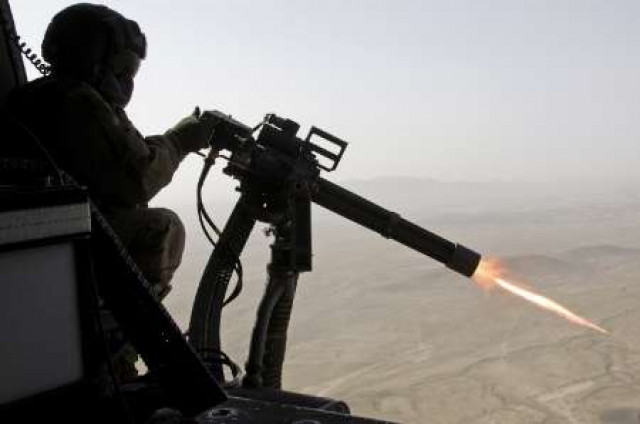NATO extends Libya air war, doubts civilian deaths
Nato has intensified its air raids in recent weeks with daily strikes on command and control bunkers.

Hours after Nato-led aircraft launched new raids on Tripoli, ambassadors of the military alliance meeting in Brussels decided to renew the mission for another 90 days to late September.
"This decision sends a clear message to the Kadhafi regime. We are determined to continue our operation to protect the people of Libya," said Nato Secretary General Anders Fogh Rasmussen.
"We will sustain our efforts to fulfil the United Nations mandate" to defend civilians from Kadhafi's forces, he said in a statement, adding: "We will keep up the pressure to see it through."
Nato, whose current campaign expires on June 27, has intensified its air raids in recent weeks with daily strikes on command and control bunkers in Tripoli to prevent Kadhafi from crushing a revolt that began in mid-February.
Wednesday's decision would give individual nations time to prepare their contributions for the next 90 days, a Nato diplomat said.
"There were very positive signs that nations will extend with the appropriate number of resources," the diplomat said.
The Libyan government said Tuesday that the air war has so far cost the lives of 718 civilians and wounded more than 4,000.
"Since March 19, and up to May 26, there have been 718 martyrs among civilians and 4,067 wounded, 433 of them seriously," government spokesman Mussa Ibrahim said, citing health ministry numbers which cannot be independently verified,
Ibrahim said these figures do not include Libyan military casualties, a toll the defence ministry refuses to divulge.
Nato cast doubt on the Libyan claim.
"We have no indications that that is the case," Nato deputy spokeswoman Carmen Romero told AFP, adding the alliance has no way to verify the claims because it does not have troops on the ground.
"Nato is conducting its operations to implement the UN mandate to protect civilians with great care and precision," she said. "This is in clear contrast with the indiscriminate attacks of the Kadhafi regime on his own people."
At a news conference in Tripoli, Ibrahim warned the departure of Libya's veteran leader, as demanded by Nato and the G8, would be a "worst case scenario" for the country.
"If Kadhafi goes, the security valve will disappear," he said.
"Kadhafi's departure would be the worst case scenario for Libya," he told reporters, and warned of "civil war."
Soon after he spoke late on Tuesday, six powerful explosions rocked the centre of Tripoli, the target of more and more intensive air raids by Nato warplanes for more than a week, an AFP journalist reported.
It was not possible to determine the targets.
In its latest operational update, Nato said Wednesday its key hits included a vehicle storage facility and three surface-to-air missile launchers in Tripoli, among similar targets in Brega, Hun, Misrata, Mizdah and Zawiya.
Ibrahim also denied that South African President Jacob Zuma, who met Kadhafi in Tripoli on Monday, had discussed an "exit strategy" with him.
Zuma "never discussed any exit strategies as they have been described in the media," the spokesman said.
The South African presidency said previously that Kadhafi would not leave Libya despite growing international pressure and intensified Nato strikes on his regime.
"Colonel Kadhafi called for an end to the bombings to enable a Libyan dialogue. He emphasised that he was not prepared to leave his country, despite the difficulties," Zuma's office said in a statement.
In London, The Guardian newspaper reported former members of Britain's Special Air Service (SAS) working for private security companies were in Misrata, the main rebel-held city in western Libya, advising the rebels and supplying information to Nato.
The former soldiers were in Libya with the blessing of Britain, France and other Nato countries, and were gathering information about the location and movement of Kadhafi's troops and passing it on to Nato's command centre in Naples, military sources told The Guardian.
Defence ministry officials denied the private soldiers were being paid by the British government and insisted it had no combat troops on the ground.
The Guardian said the soldiers were reportedly being paid by Arab countries, notably Qatar.
Reports of their presence emerged after Arabic news channel Al-Jazeera on Monday showed video footage of six armed westerners talking to rebels in Misrata.



1724319076-0/Untitled-design-(5)1724319076-0-208x130.webp)















COMMENTS
Comments are moderated and generally will be posted if they are on-topic and not abusive.
For more information, please see our Comments FAQ